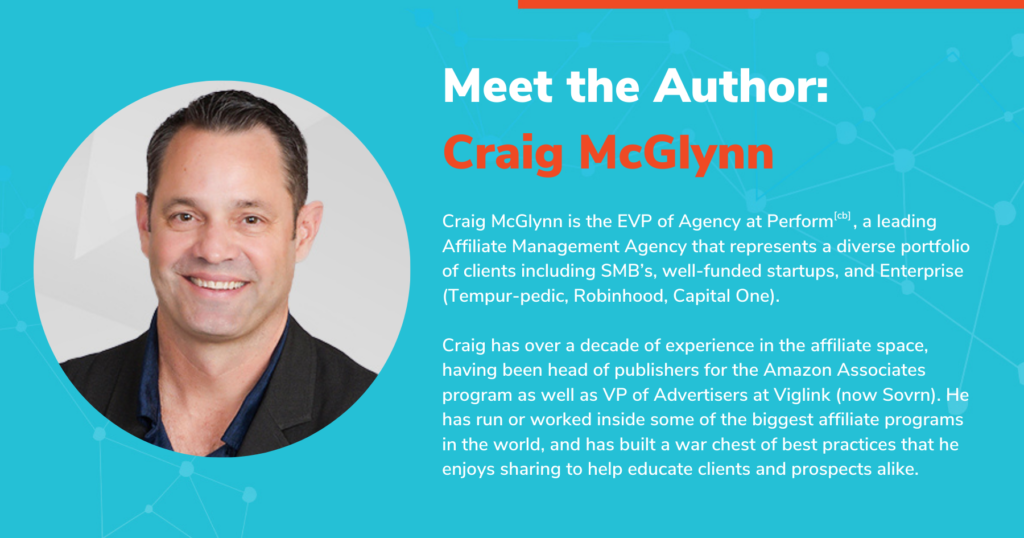- Affiliate Marketing, Affiliate Marketing & Performance Marketing Articles, Affiliate Marketing & Performance Marketing Blog, All, Featured
Navigating the Affiliate Marketing Channel with Craig McGlynn Episode 7: Working With Influencers in The Affiliate Channel
- Perform[cb]

This article is the seventh in an ongoing informative series written by Craig McGlynn, the EVP or Agency at leading Affiliate Management Agency, Perform[cb]. The series covers topics of interest to people in the Affiliate Industry, considering launching an affiliate program, or scaling an existing affiliate program. Links to the previous articles are below!
Can I Work with Influencers in my Affiliate Program?
Over the past few years, influencers have become a popular talking point within the affiliate channel when brands think about new channels to reach their affiliate program goals. Even as digital media channels expand, influencers are often the faces that consumers and brands think of when they hear the term “affiliate.” How can you know if investing in influencers will actually give you the ROI you’re looking for? Let’s discuss what influencer marketing actually looks like within the affiliate channel.
First, let’s define the term “influencer.” I’m a fan of this definition from Relatable.me:
Influencer – A creative person or group that has the ability to influence the behavior or opinions of others: The influencer is the individual who may have an effect on the purchase decision in some significant or authoritative way.
There is an expectation in the marketplace that an influencer is a public figure akin to a Kim Kardashian – someone with millions of followers who has a primary presence on social media, such as Instagram or Tik Tok, and creates both inspiration and demand around products they use often. The honest truth is less interesting, but much more effective – influencers can be “mommy bloggers” talking about their favorite subscription meal box, a finance professional creating a review video on YouTube about the best debit card, or even a millennial sharing tips online about how to furnish your apartment on a budget. Influencers are also generally categorized by their following:
- Mega: 1 million+ followers
- Macro: 100,000 – 1 million followers
- Micro: 10,000 – 100,000 followers
- Nano: 10,000 followers or less
As a general rule of thumb, the bigger the following an influencer has, the lower the engagement rate tends to be – and the higher it will cost marketers to get them to promote your product.
This chart from Oberlo is a great illustration of the correlation between the amount of followers an influencer has and their actual user engagement on Instagram.
A brand can build an army of influencers by expanding their definition of influencer to include nano influencers – particularly in niche areas where there is a strong likelihood they will promote your product or service on a performance basis rather than demanding a fixed fee. Although their overall follower count may be lower, these influencers have established a much stronger relationship with their following. For example, they may have 500 loyal readers that are inspired to buy a candle, test out a free trial on a new tax planning software, or purchase a new set of medical scrubs.
Affiliate platforms are beginning to introduce recruitment tools to help brands build out influencer partnerships, but much like my earlier post on working with content sites, bigger influencers will cost you up front dollars to create and publish a post. Further, any good affiliate agency will have the expertise and existing relationships with influencers across all of the top verticals. There are publisher groups such as LTK, Shopstyle, and even discovery platforms, like Wanelo, that function as an umbrella organization for thousands of influencers with micro-to-mega followings.
Even Amazon has entered the game with Amazon Influencers, encouraging anyone with a following (or someone aspiring to gain followers) to use tools like a storefront builder to start earning commission for sales they help make. Marketers will find that there are some networks, companies, and agencies that only cater to influencer marketing. This limitation can cross the threshold from affiliate marketing, into general PR-style influencer marketing – all pay to play advertising.
Partnering with an experienced affiliate marketing agency will make sure you’re able to get the most out of your influencer marketing strategy. Connect with an affiliate management expert today!
Stay tuned for our next episode and if you missed them, check out the other articles in this series:










